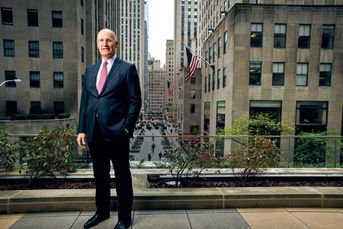The banking crisis and the absence of capitalists
Wall Street big shots. Professional “managers” (or, less charitably, mercenaries) these days have no allegiance to any one employer. Pay them, and they’ll run the show. Take away their lavish incentives and you’ll witness bellyaching that would put a United Auto Workers shop steward to shame.
One of the biggest misconceptions in our largely free-market economy is that senior corporate management and the top wheeler-dealers on Wall Street are capitalists. While they may believe in capitalism — the private or corporate ownership of capital goods — they rarely have their own money invested in the businesses they run.
They’re really corporate bureaucrats, not entrepreneurs or capitalists, even though company stock constitutes part of their hefty compensation and they talk a good game about private enterprise. I’m afraid that these faux capitalists are at the root of our current banking and credit mess.
Here’s why.
Entrepreneurs, whether or not they are great managers, are tied to their businesses. When the business suffers, they suffer. They earn less money and their wealth declines. In good times or bad, they rarely bleed their businesses for personal enrichment, because they are tied emotionally and financially to their creations. When cutbacks are necessary, there’s typically no distinction between personal and commercial; they take part in any necessary belt-tightening.
What’s more, entrepreneurs are long-term thinkers. Their time horizon is often three decades, not three months.
Contrast that with corporate executives and today’s Wall Street big shots.
These professional “managers” (or, less charitably, mercenaries) have no allegiance to any one employer. Pay them, and they’ll run the show. Take away their lavish incentives and you’ll witness bellyaching that would put a United Auto Workers shop steward to shame.
If times get tough and retrenchment is needed, professional managers have a ready response: Tighten those belts — as long as it’s not mine.
Their chief motivation is meeting their quarterly numbers, on which their compensation and job continuation ride. If they can hold shareholders at bay, even if that entails stock buybacks and other unproductive uses of capital to jack up share prices, they get to keep their jobs.
The short-term focus of corporate management at public financial companies is the underlying reason for the credit crisis. At the corporate megaliths that now constitute Wall Street, creating the financial products that ultimately caused the current mess was simply too easy and lucrative to pass up. Demand was strong for anything that paid a little bit more than Treasury securities — whether that was a plain-vanilla mortgage-backed security or some inexplicable cockamamie derivative of same.
On Wall Street, as in New York’s Garment District, demand creates supply. If customers want dresses with hems at the ankles, companies will make dresses with hems at the ankles. Similarly, if financial customers are demanding bonds that pay 4% or 6% or whatever percent, Wall Street will oblige, turning a blind eye to the source of the yield being generated.
The problem with creating debt of dubious quality is that the commissions or fees for its creation and sale are paid now, while the consequences come later.
When Wall Street was run by entrepreneurs organized into partnerships, the lure of instant big money was offset by long-term personal liability. Greed and fear were there, but everyone understood that acting like a pig was dangerous.
Today, such swinish behavior is the norm because the corporate structure has eliminated the cost of failure. Why worry about tomorrow when you can make a king’s ransom today and dump the liability for your handiwork onto shareholders and the taxpayer? Do you think former Merrill Lynch & Co. Inc. chairman E. Stanley O’Neal agonizes over the end of the Thundering Herd or do you think he’s working on his golf score and the management of the tens of millions of dollars he was paid?
Greater oversight and regulation, while plausible, won’t get us out of the current mess because the government is incapable of assessing risk. The only way to keep financial firms from offloading their mistakes onto the public is to create a modern version of the Glass-Steagall Act. That would entail splitting investment banking activities from commercial banking, and then keep the risky parts of the former in private hands where self-preservation will keep risk-taking in check.
Critics may say that the resulting investment banking firms would be too small to compete on the world stage.
Rubbish.
In business, smaller and focused is always better than bigger and diffuse (think BMW vs. General Motors).
Greedy corporate bureaucrats got us into today’s swamp. Greedy capitalists will get us out of it.
Learn more about reprints and licensing for this article.







